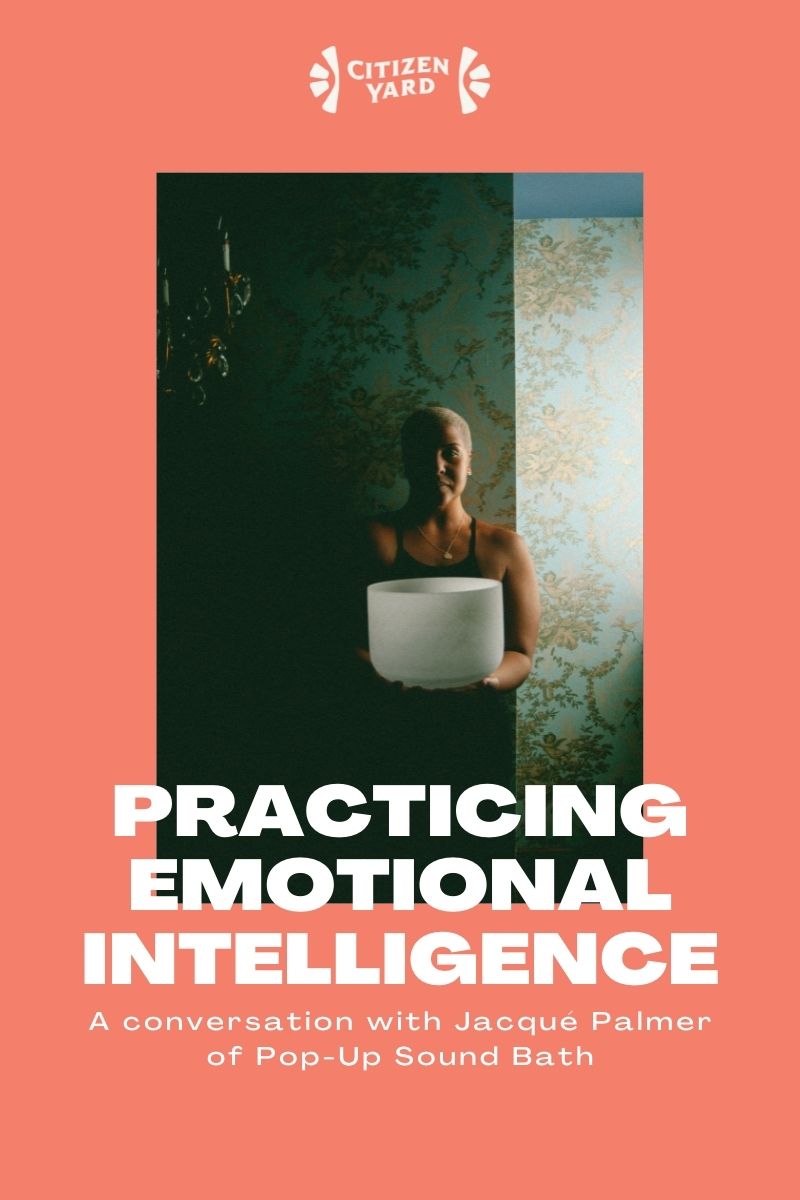
Practicing Emotional Intelligence with Pop-Up Sound Bath
If you’ve never heard of sound therapy, then let us introduce you to the EQ tactic you’ve unknowingly known about this entire time. If you’ve ever relaxed to the sounds of a babbling brook or moved to the rhythm of your favorite song then you’ve already practiced its basics. While sound therapy hasn’t quite hit the mainstream in the same way yoga has, it’s benefits range from improved sleep to lowering blood pressure.
Jacqué Palmer of Pop-Up Sound Bath as she takes us inside her business and how sound baths can help you practice your emotional intelligence.
Photos by: Nick Murray
1. Go ahead and introduce us to who you are and what you do.
My name is Jacqué Palmer and I’m a Sound Therapist who offers sound healing to groups via sound baths and individuals using the VST method.
2. What exactly is a sound bath? What are some of its benefits?
A sound bath is a healing experience where a facilitator uses a variety of sound-producing instruments like bells, chimes, rain sticks and quartz crystal meditation bowls to activate the relaxation response in the body.
The relaxation response is the opposite of the body’s fight or flight response and when activated can start to slow down one’s heart rate, lower blood pressure, and reduce overall levels of anxiety and stress.
Sound healing can also help people fall into deeper slower brain wave states, like Delta where people are in a state of hypnosis. Delta brain waves are also where the body starts to release Nitric Oxide. Nitric Oxide is a molecule that our body produces that has been found to improve memory, lower blood pressure, reduce inflammation, fight off bacteria and improve sleep.
In addition to all those benefits, sound healing has also been shown to be effective in reducing pain. According to this 2015 study, low-frequency sound stimulation proved successful in the treatment of patients with fibromyalgia.
3. This month’s theme is emotional intelligence. How do sound baths relate to EQ?
Sound baths are one way to facilitate sound healing, so they’re not technically the same thing, but are commonly used interchangeably.
I believe that in order to flex that emotional intelligence (EQ) muscle in your everyday life, you’ve got to work it out consistently. For some people that means going deeper inward, and for others outward. Sound healing allows you to do both.
In order to flex that emotional intelligence (EQ) muscle in your everyday life, you’ve got to work it out consistently.
I hear three common narratives from post-session sharing from my clients –
- 1. I was finally able to quiet the chatter in my mind,
- 2. I felt embodied, and
- 3. I left my body and came back.
And these are three very powerful and necessary healing experiences – especially when it comes to EQ regulation.
You need to be able to quiet your mind so that you can think clearly on your emotions and those of others.
If you are constantly overstimulated with thoughts, you’re not going to be able to effectively manage your emotions in a way that is healthy or sustainable.
When you feel embodied, as opposed to engaging in dissociation, it’s easier for you to put a name to those feelings and start to process what that means in the grand scheme of how you show up for yourself and others.
And when you leave your body and come back, you’re able to get out of your physical self and tap into your spiritual self. And when we start to see ourselves as spiritual entities, we can honor our feelings more deeply because we can now assign meaning to them outside of our physical selves.

4. People often perceive wellness and emotional intelligence practices as a little woo-woo. Is there actual science to back up the benefits of engaging in wellness practices? What are some other common misconceptions about EQ, wellness and sound baths?
People have been using sound and music in ritual and healing spaces since the beginning of human existence. When we’re happy we celebrate with music, singing at the top of our lungs and moving our bodies in elation. And when we grieve we heal through sounds of mourning, crying, and singing.
It’s our body’s natural response to use sounds to help us process what we’re feeling.
But I know we live in a society where that explanation is not enough. People want science, not anecdotes.
With that said, I highly encourage everyone to follow Dr. Tamara Goldsby, a research Psychologists, who studies sound healing at the Institute for Human Science in California. She published a study that showed an hour-long sound healing session helped to reduce stress levels and improve an overall sense of wellbeing in its participants.
There’s also the 2015 study on Fibromyalgia patients that I shared above. There’s also Dr. Herbert Benson, Associate Professor of Medicine at Harvard Medical School, who coined the term, The Relaxation Response, in which sound healing is one of the ways you activate that response in the body.
It’s very important to me that all people regardless of socioeconomic status have access to sound healing, whether it be through a sound bath at a community center or music classes in our public schools.
I think the most common misconception is that sound healing is woo-woo but even more damaging is the idea that this is only for wealthy people with memberships to high-end yoga and pilates studios. It’s very important to me that all people regardless of socioeconomic status have access to sound healing, whether it be through a sound bath at a community center or music classes in our public schools. There are so many ways we can make this kind of healing available to more people, but as a society, we have prioritized and incentivized prescription drugs instead.
5. We all have an origin story. What were things like for you before discovering sound baths and investing in your own emotional intelligence? How have things changed for you since?
I have been on a journey of self-discovery my whole life.
I think that happens to a lot of people who had their childhood interrupted. I can’t remember a time when I wasn’t rediscovering myself or investing in my own healing or emotional intelligence.
I’ve also been a singer my whole life, so music has always been a part of my identity. It has been a life-long practice of using my gifts of curiosity and song to heal myself.
I can say that finally embracing sound healing as a way for me to show up for others in my community and give back has been an honor.
It brings me so much joy and fills me with gratitude. I don’t think people know how much they pour into me by showing up to heal themselves and do the work.
6. What are some of your favorite ways to practice and nurture your emotional intelligence? Favorite EQ resources, books or lessons?
Journaling and writing-prompts are probably the most effective way I’ve been able to process my emotions and figure out my thought patterns.
My three favorite resources to heal and process through writing are:
- The Goddess Council’s Early Rise Writing Sessions
- Flose La Pierre’s Write to Heal Workshops
- Suleika Jaouad’s The Isolation Journal’s newsletter
I’m also a neuroscience and psychology nerd who believes that increasing your ability to become emotionally intelligent starts with understanding that you have the power to rewire your brain to do so.
I’d recommend everyone read:
- The Body Keeps The Score by Bessel Van Der Kolk, M.D
- The Brain That Changes Itself by Norman Doidge, M.D.
- Download the BrainHQ app
Playing chess can also help as you have to put yourself in the other person’s shoes in order to beat them at their own game. Oh, and these podcast episodes are great:
7. Can anyone do a sound bath? Does it require any sort of experience? Who is it for?
Most people can participate in a sound bath, although I would always advise anyone with a medical condition and/or injury, or have a pacemaker and/or medical device that may be impaired or impacted by sound vibrations and frequencies to please consult with your doctor before attending and always let your facilitator know beforehand.
Anyone can become a sound practitioner or therapist – but as with all healing work, ask yourself why you want to do this.
Holding space for other people’s healing is heavy and requires high levels of empathy and emotional intelligence. You have to be prepared to show up as your best self and ready to exchange large amounts of energy. And for empaths who tend to be drawn to this kind of work, that’s going to require developing a thick skin and strict boundaries.
But it is possible and so rewarding, so I encourage anyone who truly has it on their heart to explore – to do so.
8. What is your personal ethos in creating this business? If people were to know only one thing about you and your business what is that one thing?
I see you, I love you and we’re going to get through this together. That’s it. That’s how I show up for myself everyday, the people in my life and my community. It’s all I have to give and at the end I just hope it’s enough.
***
Connect with Jacqué and Pop-Up Sound Bath
Website: www.popupsoundbath.com
Instagram: www.instagram.com/popupsoundbath
Share :
Key Takeaway
People regardless of socioeconomic status have access to sound healing, whether it be through a sound bath at a community center or music classes in our public schools.
Next Up
Join our weekly Backyard Tailgate, a newsletter to help brands live out their mission & lead with purpose.
Each Tuesday we visit your inbox to share what we’ve learned on our own impact journey, resources, tips & tricks and introduce you to some of our world changing friends. We keep it real. We keep it honest. But most importantly, we keep it actionable.


